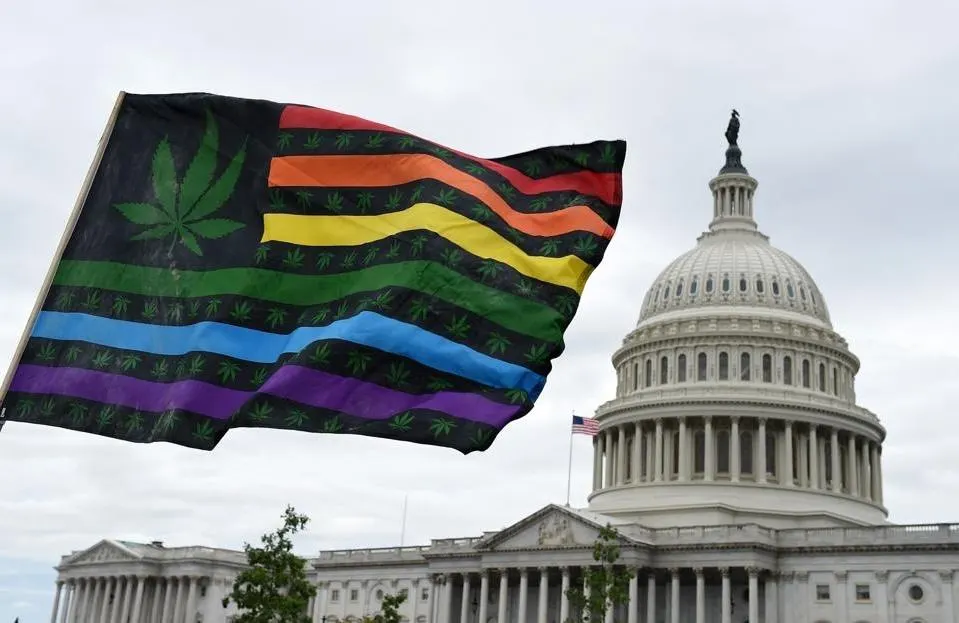Apr 30, 2024,05:43pm EDT
In a groundbreaking decision, the U.S. Drug Enforcement Administration (DEA) is poised to lift its prohibition on cannabis by reclassifying it as a less harmful substance. As reported by the Associated Press, the DEA intends to move marijuana from its current Schedule I classification—alongside heroin and LSD—to Schedule III, a category that includes drugs like ketamine, Tylenol with codeine, anabolic steroids, and the opioid-use disorder medication buprenorphine. This shift represents the most significant reform in marijuana policy since its inclusion as a prohibited substance under the Controlled Substances Act of 1970.
The DEA’s recommendation has been eagerly awaited for several months. In October 2022, President Biden instructed the Department of Health and Human Services and the Attorney General to promptly review the federal scheduling of marijuana. By August 2023, the HHS concluded its assessment, acknowledging the therapeutic benefits of cannabis and urging the DEA to reclassify it as a Schedule III drug. President Biden further addressed the issue in his March State of the Union address, advocating against the criminalization of marijuana use or possession.
While the proposal is still pending final approval, requiring clearance from the White House Office of Management and Budget and a public-comment period, the news of the Biden administration’s intention to reclassify marijuana has ignited excitement within the $28 billion cannabis industry. With regulated marijuana sales established in 38 states and sales permitted to individuals aged 21 and over in 24 states, the industry experienced a surge, evidenced by some pot stocks soaring by as much as 25% within hours of the AP report.
David Culver, vice president of the U.S. Cannabis Council—an industry trade and lobbying organization—remarked, “This is undoubtedly the most significant cannabis reform in modern history and sets us on the clear path to federal legalization.”
The DEA’s landmark policy shift is poised to have a profound impact on licensed cannabis companies, particularly in the realm of taxes. By transitioning marijuana from Schedule I to Schedule III, cannabis businesses will no longer be subject to the onerous provisions of U.S. code 280e, a punitive tax measure typically applied to drug traffickers that severely limits deductions. This alteration holds significant financial implications, as it reduces the effective tax rate for most cannabis enterprises, which currently hovers around 80% of gross revenue.
David Culver, vice president of the U.S. Cannabis Council, asserts that relieving the industry of the 280e burden represents a pivotal moment that can foster financial success. Furthermore, he anticipates that federal legalization of marijuana will catalyze broader reforms, as cannabis will no longer be classified alongside substances like heroin. This shift, Culver contends, will facilitate legislative efforts aimed at advancing cannabis reform.
However, some legal experts, like attorney Josh Schiller of Boies Schiller Flexner, caution that the move to Schedule III may not address all industry concerns. While it signifies progress, Schiller emphasizes that ongoing legal battles, such as the lawsuit against Attorney General Merrick Garland, remain unaffected. This lawsuit challenges the federal prohibition of marijuana and government interference in state-regulated cannabis programs, seeking relief beyond the scope of rescheduling.
Moreover, while the reclassification of cannabis may alleviate certain tax-related challenges, it does not resolve longstanding banking issues or enable U.S.-based cannabis companies to list on major stock exchanges like the New York Stock Exchange or NASDAQ.
Another point of contention surrounds potential implications for state-licensed cannabis businesses, particularly regarding product sales and regulatory compliance. Questions linger regarding whether recreational dispensaries can continue operations without additional licensing requirements, as federal oversight may necessitate adherence to evolving regulations.
Andrew Freedman, executive director of the Coalition for Cannabis Policy, Education, and Regulation, underscores that the DEA’s action does not equate to full legalization. He emphasizes that the criminal status of cannabis and associated penalties for consumer use persist under federal law, necessitating further policy adjustments.
Despite these complexities, the reclassification of cannabis signals a significant shift in federal policy, offering hope to investors and industry stakeholders alike. Emily Paxhia, cofounder of Poseidon Investment Management, views the Schedule III designation as a crucial milestone that validates the legitimacy of the cannabis sector within the broader economy. With institutional capital poised to reenter the market and investor confidence on the rise, the industry stands poised for a new era of growth and development.
Congressman Earl Blumenauer, a longtime advocate for cannabis legalization, welcomes the DEA’s move as a step toward ending the “failed war on drugs.” He underscores the urgency of transitioning marijuana out of its outdated legal classification, reflecting the evolving attitudes and preferences of the American people. Blumenauer remains optimistic about the prospects for comprehensive cannabis reform, emphasizing the responsiveness of the Biden-Harris Administration to the shifting landscape of public opinion and policy priorities.

